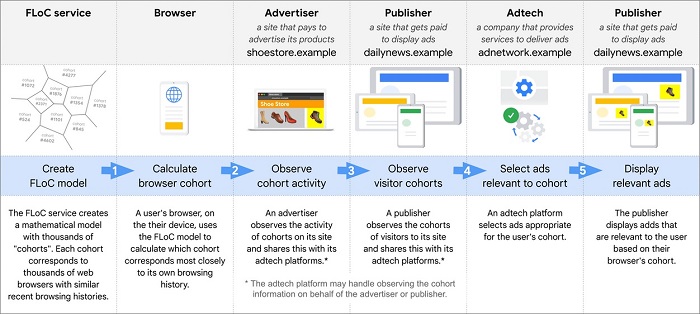Google has started testing its alternative to third-party cookies in the Chrome browser.
Called the Federated Learning of Cohorts (FLoC), the technology aims to replace invasive third-party cookies that track individuals with a system that groups internet users into broad categories based on their browsing history.
In a blog post on Tuesday, product manager of Google’s Privacy Sandbox, Marshall Vale, confirmed the advertising company was beginning the first public trials of FLoC with users who have not already opted out of third-party cookies in their browser settings.
“FLoC is a new approach to interest-based advertising that both improves privacy and gives publishers a tool they need for viable advertising business models,” Vale said.
“FLoC is still in development and we expect it to evolve based on input from the web community and learnings from this initial trial.”
The technology works by measuring a Chrome user’s browsing history locally, on their browser, and determining which larger group or ‘cohort’ they belong to based on their personal information and internet activity.
Each member of the same cohort will be assigned the same identification number and the cohorts will be large enough to mitigate against the risk of individual re-identification.
When a Chrome user with FLoC enabled enters the domain of an advertiser, such as a news website, the embedded adtech will see which cohort the user belongs to and serve relevant advertisements.
Cohorts will be effective enough at delivering targeted ads, Google hopes, that companies won’t miss being able to follow individuals across the web.
And because the user’s cohort is measured locally and apparently not sent to a Google server, the Chrome keeps their browsing history private.

How FLoC will keep ad revenue flowing and browsing history private. Image: supplied
FLoC is a purpose-built alternative to third-party cookies.
Cookies, small pieces of code stored locally on your computer that help sites know which user is which, are useful for websites so they can implement persistent features like online shopping and other forms of authentication.
Unfortunately, third-party cookies – that is, those which are not created and used by the site you are directly visiting – have been co-opted by advertising companies like Google to surveil people across the internet and learn about their shopping habits, personality traits, and political leanings.
There has been growing push-back against the technology, leading to more browsers disabling third-party cookies by default.
Google’s position, stated by Vale, is that the broader move to block cookies has led to “privacy-invasive workarounds” like device fingerprinting.
“Overall, we felt that blocking third-party cookies outright without viable alternatives to the ecosystem was irresponsible, and even harmful, to the free and open web we all enjoy,” Vale said.
Such a movement away from third-party cookies and individual tracking also threatened Google’s business model which relies on using massive swathes of private data to sell targeted advertising to businesses.
Its solution was to develop a new set of web standards that aims to stop individual surveillance, combat fraud, and improve advertisements.
For Google, the Privacy Sandbox is a win-win: it gets to send a positive message that the same company which has routinely mined its users’ personal lives for advertising revenue is now a champion of privacy, while also being the ones to build the technology that it hopes will become a new standard.
The UK’s Competition and Markets Authority (CMA) is currently investigating Google’s Privacy Sandbox and features like FLoC as it has concerns about the company developing new standards to entrench its market dominance.
FLoC is rolling out for testing to some Chrome users in Australia, New Zealand, US, Brazil, Canada, India, Japan, Indonesia, and Mexico who have not chosen to block third-party cookies in Chrome.
The browser will soon feature an opt-out function for FLoC and Privacy Sandbox features.










